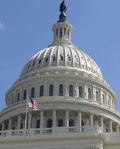
Congress returned from the August recess with just three weeks remaining to complete work on FY 2020 funding. Senate appropriators set an aggressive timeline for beginning consideration of appropriations bills with committee markups scheduled to start just one day after their return. However, progress quickly came to a halt as the mark-ups were cancelled over disagreements for spending numbers and suggestions of political “poison pills” that were previously considered off limits. Appropriators have had more than five weeks since completing a two-year budget deal to set spending allocations for the 12 appropriations bills that fund the government, but with members at home for the August recess, much work remains to finalize bills for FY 2020. As a result, lawmakers are readying a continuing resolution (CR) that will keep the government open and operating past the September 30 deadline until funding agreements can be reached.
In the likelihood that Congress first passes a CR, the Administration has submitted a request that an additional $30 million be included for the CDC’s continuing response to the Ebola outbreak in Africa.
Following the showdown that postponed consideration of the spending bills for HHS, NIH, CDC and USAID, the full committee then met and approved FY 2020 spending for the Departments of Energy and Defense. The Defense bill also included language supportive of DOD’s malaria drug and vaccine research conducted by WRAIR. These are the first two of the 12 spending bills that must be passed by committee before receiving floor consideration.
Republicans then released and approved allocations for each of the 12 bills. In the Senate, the Labor, Health and Human Services, and Education package will have a top line spending cap of $178.3 billion – a mere 1 percent increase over FY 2019 enacted levels, which has drawn the ire of Democratic appropriators. For the State-Foreign Operations bill, which includes funding for USAID, Senate appropriators have allocated $47 billion for FY 2020. While the House previously completed work on all 12 of its spending bills, it’s unclear whether they will revisit them in light of the two-year budget deal.
Although, the Administration unfroze USAID and State Department development assistance funding, the Office of Management and Budget (OMB) has now required that the remaining foreign aid funding at the State Department and USAID be apportioned, or parceled out, in one-quarter increments over each of the four Sundays in September. According to a senior administration official, this change comes at the request of the State Department who felt the 2 percent per day spending cap was too restrictive. In August, the Trump Administration sought to permanently cancel the State Department and USAID’s remaining foreign aid funding for FY 2019, but after receiving substantial pushback from Congress, including Republican lawmakers and Secretary of State Mike Pompeo, OMB instead imposed a spending cap of 2 percent per day.
Still, the somewhat unprecedented move has drawn sharp criticism from Democratic lawmakers who question the extent of OMB’s apportionment – or impoundment – authority. Given the compressed timeline before the end of the fiscal year, it’s unclear what measures, if any, could be taken to ensure full access to the remainder of the funds.
Lastly, it is still expected that the Senate will begin consideration of legislation to provide relief for the Democratic Republic of Congo’s Ebola outbreak sometime prior to September 26. As previously mentioned, S. 1340 will require USAID to provide foreign aid to Congo and others at risk and will include “multi-sectoral, non-humanitarian, and non-trade related” support. In addition, the bill will authorize amounts necessary to effectively respond to the outbreak. Any activities to improve access to affected communities would have to be prioritized.